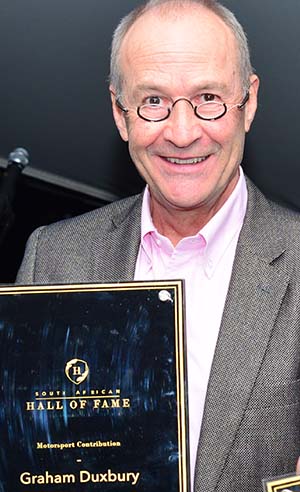One of the subjects debated to death has been Max Verstappen’s win in the 2021 Abu Dhabi Grand Prix. Was the FIA’s fumble of the Safety Car restart a “lucky break” for Max? Or was it an unlucky turn of events for Lewis Hamilton?

Graham Duxbury
It begs the question: Does luck trump skill in Formula One?
Lefty Gomez, a pitcher for the New York Yankees in the 1930s, is credited with saying “I’d rather be lucky than good”. But chess grandmaster Gary Kasparov disagrees. He says that in nearly any competitive endeavour “you have to be damned good” before luck can play a role.
In F1, determining if a win might be lucky is subjective, as racing involves a combination of skill, strategy and luck. Luck, therefore, is just one factor.
Fans and analysts often have different views on what constitutes a lucky win. Johannesburg-born author Patrick O’Brien in his book Grand Prix, a Century of Racing lists three Grands Prix that he says have seen lucky wins.
His first is the 1959 Dutch GP won by Jo Bonnier. While the win was undoubtedly a significant achievement, it is viewed as lucky because of the extremely high rate of attrition due to mechanical failures and accidents. Bonnier’s victory – his only F1 win – was also unexpected given his BRM team’s mid-pack form.
The second lucky win, according to O’Brien, is Giancarlo Baghetti’s triumph in the 1961 French GP. It was unique in that it that it was Giancarlo’s first World Championship F1 race and he had qualified well down the grid in an older, privately-entered Ferrari.
But once again attrition played a significant role and Baghetti found himself in second place and able to slipstream past Dan Gurney’s Porsche for the win on the last lap.
Giancarlo would never finish on the podium in a F1 race again despite racing at the top echelon of motorsport for another six years.
The final race in which luck triumphed, in O’Brien’s opinion, is the 1971 Italian GP at Monza. This race featured the closest finish in F1 history, with Peter Gethin’s BRM beating Ronnie Peterson’s March by 0,01 seconds. The top five finishers were covered by just 0,61 seconds.
Unlike the other two races, attrition was not a factor. Gethin’s win – his only GP victory – is considered lucky due to the incredibly close finish and BRM’s mid-field status.
In the light of these outcomes, could Pastor Maldonado’s victory at the 2012 Spanish GP be added to the lucky wins list?
The race was Pastor’s only win and the Williams team’s only victory since 2004. So, it’s certainly an anomaly.
Pastor – a good but not exceptional driver – had surprisingly qualified second on the grid and inherited the pole when Hamilton’s McLaren was disqualified. Then, in the race, he not only passed Fernando Alonso, but held off the Spaniard’s Ferrari to finish ahead by three seconds.
The key to his success was tyre preservation on a day when many drivers suffered from degradation.
The “lucky” victory sparked a number of unlikely conspiracy theories. One suggested he had used Pirelli-supplied performance-enhancing tyres to provide Frank Williams with a win on his seventieth birthday.
What about other drivers? Are any considered lucky?
Lewis Hamilton has certainly caught lucky breaks from time to time (despite Abu Dhabi 2021) and a number of instances are cited where Lady Luck has come to his rescue.
On the other hand, former F1 driver Chris Amon was considered unlucky. He was widely regarded as the best driver never to win a world championship grand prix. This despite finishing on the podium 11 times for the Ferrari, March and Matra teams.
Perhaps the phenomenon recently highlighted by Red Bull boss Christian Horner is accurate. He says good luck and bad luck tend to cancel each other out over time.
O’Brien accepts this theory as he highlights the example of Jody Scheckter in the 1977 Long Beach GP which he led until four laps from the end when he picked up a puncture letting Mario Andretti through to win.
Later in the year, at the Canadian GP, Andretti was leading when he experienced engine problems letting Jody through to win. “Scheckter lucked into first place” was world champion James Hunt’s less-than-accurate appraisal.
